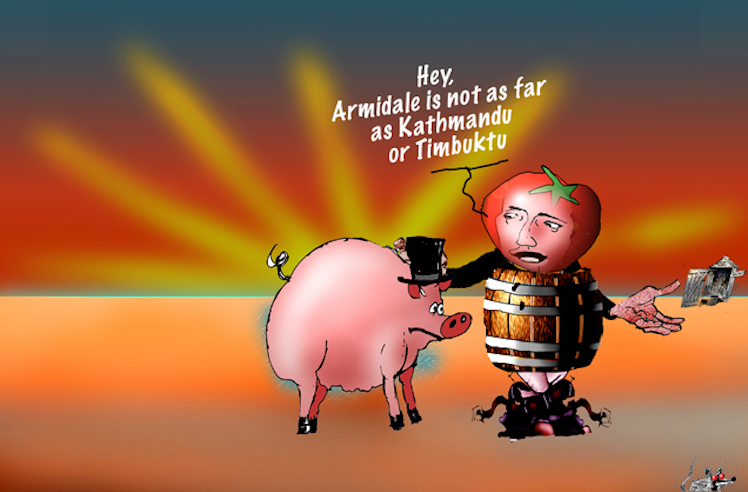Barnaby Joyce’s decision to move the Australian Pesticides and Veterinary Medicines Authority (APVMA) to Armidale has proven to be another cluster cock-up. As minister for agriculture, Joyce presided over the live sheep trade and Murray Darling water theft scandals. More recently, in his role as drought envoy, he has been criticised for wanting to divert environmental water from the Murray Darling to agriculture, in breach of the Federal Water Act. “Triskele” reports.
Wannabe back-to-the-future National Party leader Barnaby Joyce is often admiringly referred to as “Australia’s greatest retail politician”.
But who or what is he selling? Is he a sales wizard who can sell ice to the Eskimos and oil to the Arabs? Or is he a shameless pork barrel merchant, and if so, is he a competent one?
In the curious case of the relocation of the Australian Pesticides and Veterinary Medicines Authority (APVMA), we may find part of the answer.
On 25 November 2016, then Deputy Prime Minister and Minister for Agriculture and Water Resources Barnaby Joyce announced the relocation of the Australian Pesticides and Medical Veterinary Authority to Armidale, as part of his commitment, announced 15 May 2015, to decentralise certain Commonwealth services to the regions. According to this policy, public service agencies “with agricultural policy or regulatory responsibilities” had to be situated in the regions, and not within 150 kilometres of Canberra or of another state capital. The relocation of the APMVA was scheduled for mid-2019, against the wishes of the APMVA itself and most of the major stakeholders, and flying in the face of an Ernst Young report ordered by the government, which showed little to no benefit would be derived from the move. The move was decreed by the Coalition by regulatory order, thus bypassing parliament.
This move is a very big deal for rural and regional people. The APMVA is the Australian government statutory authority responsible for the regulation of all agricultural and veterinary chemical products entering the Australian market. It sets standards to be adhered to; controls the entry of substances; provides education on compliance; and monitors and enforces compliance. It ensures that substances are properly used and do not harm human and non-target animals and plants. In a recent Four Corners episode, the issue of whether the controversial glyphosate (key ingredient in RoundUp) was a danger to public health was again raised in the wake of a recent American court case in which a jury found that RoundUp (made by Monsanto, now owned by Bayer) was a substantial factor causing a groundkeeper’s terminal cancer.
While the APMVA has denied that there is a scientific basis for the concerns, if in time they are proved to be wrong, revisiting the regulation of this product is exactly the kind of work it would be responsible for. From 2013, the APMVA has been funded almost entirely on a cost-recovery basis. Product registrants must pay application fees; any cost blowouts at the APMVA would therefore have direct implications for those wanting to register a new substance, as fees would most likely have to increase. The stakes are high.
Many have sneered at the APMVA move on the basis that it is Joycean “boilerplate pork barrelling”. The view you take of pork barreling however is really in the eye of the beholder. In regional and rural areas where constituents often consider themselves to be more or less ignored by Canberra and excluded from the benefits of redistributive policies, pork barreling is just a way of evening up the ledger. The real question therefore is whether the purchaser of the pork is obtaining the prime product or not.
In what must have resembled a scene from “Utopia”, the ABC comedy (or possibly, fly-on-the-wall-documentary — it’s hard to tell), Ernst Young very guardedly produced an exquisitely calibrated report to the government, arguing that the relocation of the APMVA “may provide” “potential benefits”. However, the risks associated, the report noted, “are significant”. These included loss of staff; lowered capacity to do its key work of regulation of new agricultural and veterinary chemical products; and reduced access to stakeholders. They noted that “critically, the loss of technical assessment staff (regulatory scientists) has the potential to seriously disrupt the ability of the APMVA to successfully fulfil its purpose and achieve its objectives in the short and medium term”. EY stated that the limited benefits could materialise if the key risks were identified and if the transition was executed properly. The key risk was the loss of many highly specialised staff; consultation with staff led them to the conclusion that 85 per cent of staff overall would refuse to move, and 78 per cent of the regulatory scientists said they would not relocate.
The cost of the move was estimated to be $25.6 million and the economic assessment of relocation was estimated at $23.19 million (over 20 years), which “excludes any potential cost to the industry arising from the risks to the agricultural sector, the chemical industry or Australia’s trading reputation …To effectively undertake the move of the APMVA and adopt relevant risk mitigation strategies, the cash cost to the government could be significantly higher than the estimated economic cost of $23.19 million.”
However, if the risk management was poorly done, the costs of the move could be much higher than what was suggested in the cost benefit analysis:
“Based on conservative estimates of a one year delay in the approval of new products, the potential impact on the agricultural sector for crops alone could be between $64 million and $193 million per annum. The risks to the agvet chemical industry associated with moving the APMVA are also significant with a one year delay in the approval of new chemicals potentially impacting industry to the value of between $0.8 million and $2.7 million per annum in terms of lost revenues”.
This was far from a compelling case, and in its own investigation of the order to relocate, the Senate Finance and Public Administration References Committee concluded that “there is only one obvious driver for the decision, and that is political self interest.” In its excoriating report, tabled in June 2017, the timeline of events that led to the making of the order demonstrated quite clearly that there was no cabinet process; there was no consultation with the parties; and the entire process was run in an ad hoc fashion, against the opposition of the authority itself, of stakeholders and of the agricultural sector. APMVA staff found out about the proposed move to Armidale via the media; when they stated they preferred to move, if a move was required, to the regional centre of Toowoomba, this was ignored. Other possible regional centres were not consulted. The timeline also suggested that the minister had made the decision to move the APMVA to Armidale ahead of the EY report and irrespective of what the EY report showed. Tellingly, the Senate also found that “…neither the Finance Minister nor his department applied financial or policy scrutiny to the application from the Deputy Prime Minister.” There seemed to be no template in existence for the process of making the case for moving an agency and no structure for doing so.
The Senate committee recommended that the order be revoked, and that the move be paused until the business model could be reviewed; recommendations which, of course, were noted by the government and summarily rejected.
So having sold the product, how did the pork merchant do? Well, the predicted risks materialised immediately, and have since become compounded.
Firstly, the feared exodus immediately began. In the aftermath of the decision to move, 20 of the 100 regulatory scientists left, and since then, other staff have also marched away, including the CEO. The agency has struggled to recruit new people since. In the early days of the move, the APMVA immediately made itself look ridiculous when reports emerged that some of the staff had been working from the Armidale McDonald’s because of a lack of office facilities. Joyce did not deny that staff were working from Macca’s, but said that this was not because of a lack of office space, but due to personal choice.
This is an obvious place in the narrative for a snarky comment, but I will restrain myself and allow you, the readers, a moment to guffaw quietly to yourselves.

Australian Pesticides and Veterinary Medicines Authority’s Armidale office
A great deal of the success or failure of the move – and possibly of the decentralisation initiative more broadly – depends on the existence of an e-strategy, which will allow people to work from home, and to connect workers remotely across different sites. The APMVA itself was not supportive of the usefulness of this idea, and over time, the wheels seem to be coming off the $10.1 million strategy. A report of July 2018 suggests that the APMVA would be keeping up to 40 staff in Canberra after all, as the e-working trials had failed to stop relocation risks from harming their work. At last count, there were 40 staff working in Armidale; around 20 per cent of the agency’s staff were expected to stay in the capital; and a senior executive director role was being publicised in Canberra rather than Armidale.
Secondly, the organisation’s performance predictably plummeted. The APMVA had been working hard to improve its work outputs, which were not meeting targets even before the move, but predictably, since the move commenced, performance has taken a hit. In May 2017, the industry lobby group CropLife pointed to the APMVA’s catastrophic drop in achieving its targets, have achieved only 30 per cent of its crop protection registrations work within statutory time-frames, down from 82 per cent from the September quarter of 2016. According to a recent ABC report, the APMVA has missed its own deadline and is three months late delivering a review of Chlorpiryos, a chemical banned in other countries and linked to brain damage in children. The review is now not due until early 2019.
Thirdly, during the process of consultation in the lead up to the Senate inquiry, as the Senate sourly noted, Joyce encouraged councils to “shift the focus of this inquiry” by sending them all a letter asking them to advocate to the Senate for decentralisation, and by providing a form letter on a website to do so. In consequence, dozens of councils lodged submissions touting for a piece of decentralisation pie, like Dickensian orphans with begging bowls lining up for a second cup of soup. This was an inevitable reaction, as noted by the Senate committee, but it was not necessarily an outcome welcomed by the councils themselves. The lack of transparency and evidence-based policy making was criticised by some, who expressed concerns that the policy was politicised, and that “regional councils could cannibalise each other’s growth”. Joyce’s initiative resulted in many hours of wasted work, and the chaos it unleashed it would seem has jacked off some of the constituents.
Keeping track of the costs associated with all this malarkey will be a tale in itself. I have already described the farcical vagueness of AusTender elsewhere on this site. Blowouts can easily be expected, but will be hard to track. Even more unknown is what the implications of the move might be for the agricultural industry sectors that pay the fees and therefore fund the bulk of the work of the APMVA.
More broadly, the coalition’s decentralisation policy is also at stake. The APMVA move is strongly suggestive of a complete lack of process, transparency, or due diligence. The implicit failures of the Joyce relocation schemozzle can be deduced in the behaviour of ministers since. Cormann is now actively devising a template for future business cases for decentralisation. The criteria being applied and the template are not publicly available, and in any case, it does still beg the question why the decentralisation makes sense in the first place, but at least there will be a process for applications and for decision-making — assuming the policy survives at all, given the tenuous grip of the LNP in power. As for the new minister for decentralisation, Bridget McKenzie, she was reported as saying that while she was still committed to the decentralisation policy, the policy would be refocused on the private sector rather than the public sector, in order “to ensure we have the right jobs in the right places to encourage people to move into the regions.”
So, where has this all ended up?
Barnaby Joyce has demonstrated repeated failures of judgement. There is much to contemplate without having to raise anything which touches on his personal life. Let’s recall how a review of the live sheep export market found that a culture of fear inside the department led to a failure to investigate animal welfare, and therefore to a failure of regulation of the industry. Part of this failure can be directly attributed to Joyce making deep cuts to the animal welfare branch of the department.
Or let’s reflect on the recent scandal surrounding the operation of the the Murray Darling Basin plan, when Joyce famously refused to intercede as Commonwealth Water Minister in the matter of water theft in the Murray Darling Basin, exposed in an explosive investigation by the ABC’s Four Corners . Joyce also distinguished himself by publicly arguing for diverting environmental water for agricultural use. This reflected his “triple-bottom line” approach to the Murray Darling Basin Plan and the Water Act 2007, by which he meant the plan had to satisfy social, economic and environmental outcomes in that order. The “triple bottom line” idea is not contemplated in the Water Act 2007, and his original interpretation arguably put him on a course of acting extra legally. We will discuss this in more detail in an upcoming piece.
Last, but definitely not least, on this website, Simone Marsh has also published work pointing to Joyce’s personal conflicts of interest involving his property interests and his connections with the gas industry.
Investigation: Barnaby’s gas bonanza and the pervading influence of the gas lobby
The Akubra-hatted author of Weatherboard and Iron is a former accountant who attended an elite Sydney high school. He is the son of a vet and a physiotherapist who started working the land in the 1950s. While he is heavy on his affinity with common rural folk who live in weatherboard houses, his relationships with people like Gina Rinehart raise questions about where his true affinities lie. His epic failures of judgement cast a real shadow on his retail salesmanship. Even as he currently tries to manoeuvre himself back into a position to take on the leadership of the National Party, there is pushback from rural women still angry with the response of the Nationals to the Catherine Marriott case; and a new political movement is building –Anyone But Nats – reflecting the concerns of regional and rural people frustrated by the continuing lack of policy around climate change.
Is anyone buying what Joyce is selling anymore? Is he Australia’s greatest retail politician? Or is he, as the Texans would put it, “all hat and no cattle”?
backbench sunset ..@FinancialReview #BarnabyJoyce #auspol pic.twitter.com/KjnMimYUCG
— david rowe (@roweafr) February 23, 2018
——————-
The above investigation is published anonymously at the author’s request. “Triskele’s” identity and bona fides are known to us. “Triskele”  is an academic and journal editor as well as independent researcher interested in politics, history, current affairs, books, languages, and “all things nerdy”.
is an academic and journal editor as well as independent researcher interested in politics, history, current affairs, books, languages, and “all things nerdy”.
Public support is vital so this website can continue to fund investigations and publish stories which speak truth to power. Please subscribe for the free newsletter, share stories on social media and, if you can afford it, tip in $5 a month.
The above investigation is published anonymously at the author’s request. Triskele’s identity and bona fides are known to us. Triskele is an academic and journal editor as well as independent researcher interested in politics, history, current affairs, books, languages, and “all things nerdy”.
